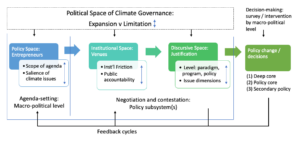Political Spaces of Climate Governance
Politicization and Policy Stability in the EU and US
Rationales and Question
Climate change has moved to the center of political debate in many Western democracies, to the point that it has become a defining political issue. A familiar concept to capture this dynamic is politicization, but a complicating factor for its evaluation is that it aims at a moving target: As an essentially variable and multi-faceted political issue, and in response to exogenous shocks, climate change is addressed in agendas that define the scope and priority of necessary action in very different ways and by creating new linkages with established policy priorities, particularly in recent proclamations of a green recovery. These related dynamics of politicization and re-framing of climate action cast a new light on extant academic debate on the role of policy stability as a condition of success for policy progress against climate change: particularly, the presence of a stable long-term agenda, incremental policy-making in an institutional setting isolated from external disruption, and efforts to support the adoption of broadly accepted and irreversible policy results. From this point of departure, the project seeks to advance research debate on two related questions:
- How do factors of policy stability and vectors of disruption and conflict interact in extant settings of climate change governance?
- What are observable effects of these interactions on policy-making results?
Theoretical Framework
The project proposes the concept of political space to capture both the expansion of politics associated with climate change, and its highly variable definition and framing as a field of policy-making. Building on the theoretical literature on the link between policy beliefs, institutional venues and policy change, this term is harnessed to relate three components of climate governance that include aspects of space and dimensionality:
- its policy space as the scope and framing of political agendas proposed to deal with the climate crisis;
- the corresponding institutional space as the format of institutional venues that are selected as relevant for negotiating policy issues; and
- the discursive space evolving from the depth and issue dimensions of controversy between involved policy-making agents and coalitions.

A first set of hypotheses addresses how the three dimensions of political space discussed here are interlinked: particularly, how the institutional and discursive spaces respond to an expansion or disruptive change of the policy space as defined by present agendas and policy images. The framework suggests that an expansion of climate action agendas involves further institutional settings with greater friction and accountability, thereby also prompting deeper and more multi-dimensional contestation.
A second set of hypotheses inquires into the link between the stability or disruption of extant governance frameworks and policy-making results. In this regard, the framework weighs the assumption that an expansion of the policy space prompts pressures towards policy change with the expectation that these presssures are also likely to mobilize interests opposed to climate action and to increase institutional friction and deeper discursive contestation. Rather than assuming a direct or linear causal relationship between degrees of political conflict and policy change, the model is used to evaluate how configurations of factors, particularly a relative stability of the institutional space, work towards supporting climate policy.
Work in Progress and Preliminary Results
The project has started on 1 July 2023 and is currently in the first phase of theoretical and conceptual specification and preparation of field research. Ongoing work in progress and results include:
- Book project: Climate Politics at the Crossroads (Contracted with Routledge)
- Article: European Green Deal Agenda after the attack on Ukraine
- Working paper: Politicization of Climate Change Governance
The questions, theoretical approach and research program of the project are also described in a Working Paper of the CSS, available here, and in a shorter version in a poster available here.